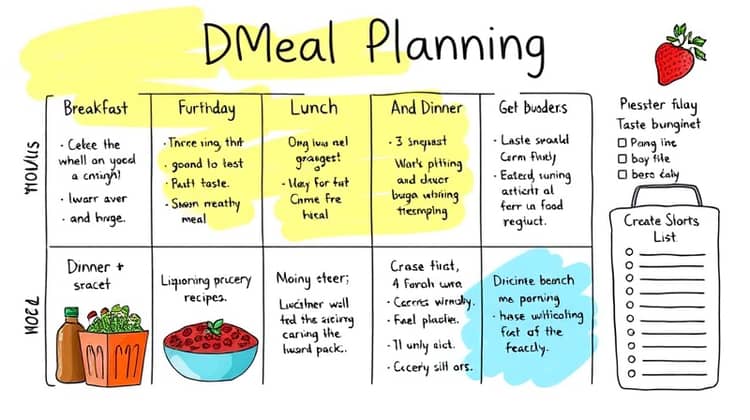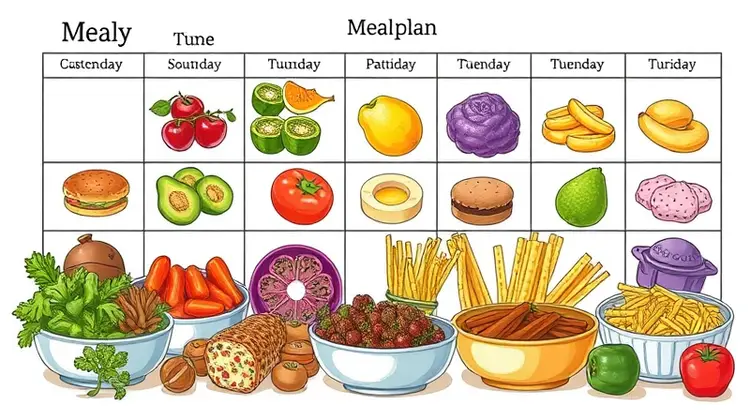In today's fast-paced world, students often find themselves balancing academics, social life, and financial constraints. One essential skill that can help manage these aspects is meal planning. By organizing meals ahead of time, students can save both money and time, leading to a healthier lifestyle without breaking the bank.
This guide will take you through the importance of meal planning specifically for students, providing practical tips and tools to create and adhere to a budget-friendly meal plan. Whether you're living in a dorm, an apartment, or at home, you'll find strategies that work for your unique situation.
Why Meal Planning is Important for Students

Meal planning is particularly important for students who often juggle busy schedules filled with classes, homework, and extracurricular activities. By planning meals ahead of time, students can avoid last-minute takeout or unhealthy food choices that can arise from a lack of preparation or time.
Additionally, meal planning helps students better manage their finances. By organizing meals and shopping effectively, they can stretch their budget further, allowing for savings that may be used for other necessary expenses or leisure activities.
- Saves time during the week
- Helps avoid unhealthy fast food choices
- Reduces food waste
- Encourages healthier eating habits
Ultimately, meal planning provides a structured approach to nutrition that fits into a student's hectic lifestyle, ensuring they stay fueled and focused for their studies.
Assessing Your Budget

Before diving into meal preparation, it's essential for students to understand their financial situation. This means taking a close look at monthly income, whether from a part-time job, allowances, or financial aid. Knowing your financial limitations can help establish a reasonable budget for groceries and dining.
Once a clear budget is established, students should allocate funds for food while considering other expenses such as rent, textbooks, and transportation. This comprehensive financial picture will allow students to prioritize their food spending effectively.
Basic Tools for Meal Planning

Having the right tools can streamline the meal planning process significantly. Students should start by investing in a planner or using a digital calendar to map out meals for the week. This helps visualize what to eat each day and ensures variety is included in their diet.
Additionally, keeping a list of affordable recipes and an ongoing grocery list is immensely beneficial. With these resources, planning becomes less daunting and allows for a more organized cooking experience.
- Meal planner or digital calendar
- Grocery list app or paper list
- Recipe book or online recipes
- Leftover storage containers
These tools enable students to stay on track with their meal planning, making the overall process more efficient and enjoyable.
Steps to Create a Meal Plan

Creating a meal plan involves a few straightforward steps that anyone can follow. First, identify what meals you need to plan for the upcoming week, including breakfast, lunch, dinner, and snacks. Consider your schedule to determine how much time you will have for cooking each day.
Next, choose recipes that fit both your taste preferences and budget. Make sure you account for ingredients you already have at home to minimize unnecessary purchases.
- Assess your weekly schedule
- Select recipes considering cooking time
- Make a shopping list based on chosen recipes
- Shop with your list to stay within budget
Following these steps will help ensure that you stick to your meal plan and make the most of your food budget.
Budget-Friendly Food Staples

Filling your pantry with budget-friendly staples is key to successful meal planning on a student budget. These staples can serve as the foundation for many meals, allowing for flexibility and creativity without overspending.
- Rice - a versatile base for many dishes
- Beans - a great source of protein
- Frozen vegetables - long shelf life with great nutritional value
- Oats - a healthy breakfast option that is also filling
- Canned tomatoes - useful for sauces and soups
Investing in these staples provides a solid foundation for meal planning and a varied diet, making it easier to whip up quick meals without breaking the bank.
Sample Weekly Meal Plan

To illustrate how meal planning can work in practice, consider this sample weekly meal plan designed to be both budget-friendly and nutritional. This plan includes a variety of healthy foods, ensuring that students receive a well-rounded diet while keeping costs low.
By sticking to a simple plan, students can manage their time better and ensure they are eating healthily without needing continuous trips to the grocery store or fast food establishments.
Tips for Sticking to Your Meal Plan

Sticking to a meal plan can sometimes be challenging, especially with the demands of student life. However, there are several strategies students can adopt. One effective tip is to treat meal planning like a commitment, much like their classes or work responsibilities. This mindset can help prioritize meal preparation.
Another useful strategy is to prepare meals in batches. Cooking larger quantities and storing them in portions for later use can save time during particularly busy weeks, helping maintain dietary goals without extra effort.
- Make meal planning a weekly ritual
- Prepare meals in advance to save time
- Stay flexible; adjust meals based on food availability
- Track spending to remain within budget
By following these tips, students can enhance their chances of sticking to their meal plans without feeling overwhelmed.
Conclusion

Meal planning can have a significant positive impact on a student’s lifestyle, both financially and nutritionally. It encourages healthier eating habits, ensures better budget management, and ultimately leads to a more balanced student life. By approaching meal planning with the right tools and strategies, students can transform the way they view food and expenses.
As students take on the challenge of balancing their academic and personal lives, meal planning emerges as a practical solution to help them thrive amid their busy schedules. With time, preparation, and commitment, students can harness the benefits of meal planning on a budget.














